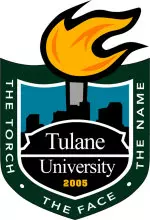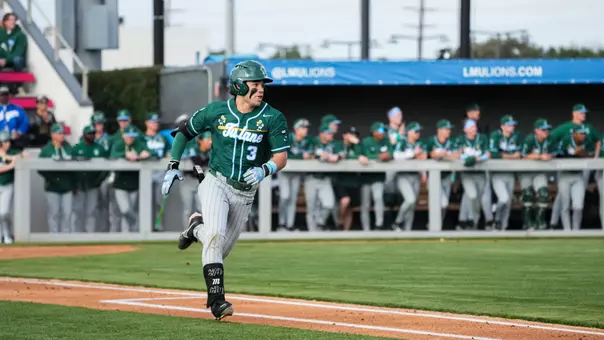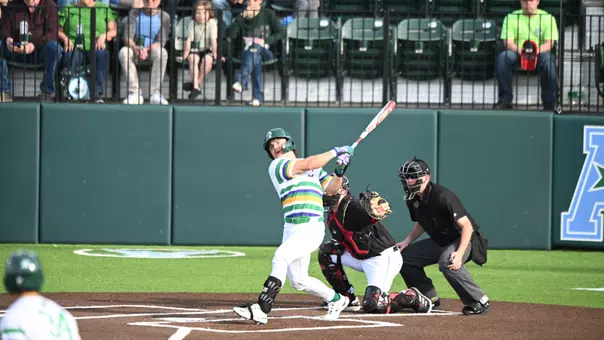
Hurricane Katrina Information
Apr 26, 2006 | Baseball
For the players, coaches and staff of Tulane Athletics and all the residents of New Orleans and the Gulf Coast, there was little warning that Hurricane Katrina would have a far-reaching effect on not only the fall 2005 semester, but on the rest of their lives.
On Saturday, August 27, Tulane freshmen were on campus preparing to take part in orientation when the evacuation order came. By noon Sunday, the campus had cleared out as everyone returned home or, in the case of Tulane football and soccer players, evacuated as a team in buses bound for Jackson, Miss.
Tulane baseball coach Rick Jones and his coaching staff, coming off a season in which they spent 21 weeks as the nation's No. 1 team and advanced to the College World Series, also hit the road after ensuring that their players had left the city. The staff had spent the previous week preparing for the arrival of a large group of newcomers while storing new equipment and watching as demolition work on Turchin Stadium, which was undergoing renovation, continued.
Like the rest of America, the team watched as the levees broke and the city, including the Tulane campus, flooded. They wondered about the immediate future of Tulane, and about the 2006 season. While the answer would be provided by the end of that week, the wait seemed much longer.
On Friday, Sept. 2, Tulane President Scott Cowen gave the word that the Green Wave athletic teams would continue to compete - carrying the torch, representing the name, and becoming the face of Tulane University - even though the university would not hold classes on its campus for the fall semester.
"Every time Tulane athletics goes out there...it will remind people to say, `this team and all the students are not at the university. They are, in a way, homeless," Cowen said. "[They] will be a constant reminder. And one of the things I want to make sure is that people in the United States don't forget the devastation that occurred to New Orleans and how people have been impacted by it now and for the rest of their lives."
At that point, Tulane Athletic Director Rick Dickson and his staff sprang into action - working the telephones and figuring out the logistics of operating a 300-athlete, 16-program department with a full-time of staff of 100 from somewhere other than New Orleans.
In the end, no single site could accommodate the entire department. Instead, Tulane student-athletes, coaches and support staff headed to four different campuses (see below) with the baseball team assigned to live, practice and attend classes, in Lubbock, Texas on the campus of Texas Tech University.
"I can't say enough about the tremendous outpouring of support we have received from every single person we have spoken to over the last several days," Dickson said in announcing the plan. "Our priority was to continue to provide a high quality academic and athletic experience for our athletes. This plan could not have come together without their help." As his players and staff headed to Lubbock, where classes had already started, Jones lauded the actions of the Green Wave administration.
"We are lucky to be in the position we are in, especially when you look at some of the people that didn't fare so well in our city," Jones said. "Our administration put in a game plan immediately...and I can't say enough about the job they did."
On Sept. 7, nine days after Katrina hit, team members began making their way to Lubbock, and within days all 37 baseball players were enrolled in classes and situated in dorm rooms as the Texas Tech administration rolled out the red carpet for members of the Tulane baseball and women's basketball teams.
As the Green Wave were getting acclimated to their new surroundings, many Texas Tech fans and members of the Lubbock community reached out to help the Tulane players and staff get settled.
"The folks here in Texas, Lubbock and Texas Tech University have truly been unbelievable," said Tulane Head Coach Rick Jones, who moved to Lubbock along with his coaching staff and their families. "I've been here less than 24 hours and there is no way anyone could make you feel more welcome than the entire administration has made us feel here at Texas Tech."
Perhaps one of the biggest challenges the Tulane players faced in Lubbock was adjusting to the school itself. Familiar with the quaint, park-like setting of the Tulane campus and the vibrancy and culture of New Orleans, players faced a stark contrast at Texas Tech, a huge public university with an enrollment of 29,000 located in a university town in northwest Texas. Buses and bikes were required to get across campus. In contrast to the lush greenery and steamy heat of the Big Easy, players adjusted to wide expanses of flatland and increasingly chilly temperatures.
"For the first couple of weeks there, you felt like the new guy," Tulane senior Nathan Southard said. "But everyone at Texas Tech made it a lot easier. We showed up two weeks into their semester, and the professors and the students really helped us adjust. A lot of guys on the team are from Texas, so they knew people there, and I made some friends in Lubbock that I still talk to."
As the baseball players settled into classes and found their way around campus, the Green Wave coaches were working to secure replacement equipment that would allow the team to hold fall practice and individual workouts. The Texas Tech baseball staff shared its field and the Green Wave moved into the facility's visitor's locker room for the semester.
Soon, fall practice commenced, and the staff and team was able to establish a routine with classes, study halls and workouts. They even held the annual Parents' Weekend in Lubbock and heard from legendary basketball coach Bobby Knight, as he addressed the team after an invitation from Coach Jones.
The team even experienced a Lubbock snowfall before finals concluded on Dec. 14. As they packed for home before heading back to New Orleans for the beginning of classes and practice on January 17, the memories of the hospitality and outpouring of support from the Texas Tech and Lubbock communities remained with the baseball staff and student-athletes.
"When we came to Lubbock, we told our players to turn this into a positive situation, and they've done that," Jones said. "Our guys really had a foxhole mentality during fall workouts and that is something that we believe will transfer over to the spring as well."
"[The pressure of being No. 1 last year] wasn't pressure compared to trying to hold it together in a situation that was totally unprecedented. We've responded to adversity as well as you could possibly hope for, and our kids already have something historical from this year they can draw on for the rest of their lives."
















